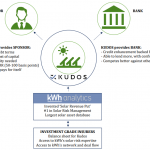Permaculture Design and Stock Market Investing
by Tom Konrad Ph.D., CFA
Passive Investing And Modern Agriculture: Parallels
Today's stock market is a dynamic and scary place.
Once choosing stocks to invest in based on the fundamental value of the companies they represent (called fundamental or value investing) was the dominant paradigm for investors. No longer. In 2017, JP Morgan estimated that only 10 percent of trading came from fundamental investors. The vast majority of trading now comes from computer based algorithmic trading, and passive investors following pre-defined rules, such as index investors. According to Morningstar, nearly 45 percent of all stocks are owned by passive investors. These should...
Free Talk: A Permaculture Portfolio
For readers in the Hudson Valley, I will be giving a free talk next Monday night. I will speak about applying permaculture design principles to your investment strategy. While I developed my own strategy over the last two decades without any reference to these design principles, now that I'm familiar with them, I realize that I have been thinking along these lines for a long time. The design principles are remarkably robust and intuitive.
I used to think Permaculture was just about redesigning our food systems, but it's much much more than that.
The talk is sponsored by the Rondout Valley...
Opportunity Hiding in Plain Sight
Information asymmetry, climate investing and the active management edge.
By Garvin Jabusch
The theory of efficient markets says all stock prices are perpetually accurate, because investors always have complete and up-to-date information about their holdings.
But as any casual observer knows, information and topical awareness are not evenly distributed, even among professional analysts. Reality is always far more complicated than equity markets can quickly assimilate, meaning information asymmetry is a constant. While usually considered a type of market failure, information asymmetry is frequently used as a “source of competitive advantage.” The person with the most information is best equipped to make the best...
How Weather Risk Transfer Can Help Wind & Solar Development
by Daryl Roberts
The Need To Accelerate Renewables Adoption
Renewables are growing rapidly as a percentage of new electric generation, but are still being assimilated too slowly and still constitute too small of a fraction of total generation, to be able to transition quickly enough to scale into a low carbon economy in time to mitigate climate change.
The issue of providing public support, with subsidies and other reallocation methods, is a politically charged subject. High carbon advocates, for example American Petroleum Institute, argues that support for renewables distorts the market. On the other hand, it has been argued, for example by...
Should I Sell My Mutual Fund To Go Solar?
by Tom Konrad Ph.D., CFA An enthusiastic solar volunteer recently asked me: “What can I invest in to prepare for the next financial crisis?” The situation made the question deeply ironic. The woman asking me was trying to help people invest in solar systems through Solarize, a nonprofit, community-sponsored group buying and discount program. Our town of Marbletown, New York and the neighboring towns of Rochester and Olive have just launched Solarize Rondout Valley, a campaign open to residential and commercial building owners in Ulster County. Solarize campaigns are designed to make it easier and cheaper...
The Problem With Proxy Ballots
Vote With Money Instead by Garvin Jabusch Many people assume that engagement with public companies through proxy voting and resolution filing is the best if not only way to see positive environmental, social, and governance outcomes from your investments. For me, this approach misses a fundamental point of market-based solutions: you make in investments in the most compelling ideas that reflect what you think is likely to grow, where you think the economy is headed, and yes, outcomes you support. That means using investments to favor firms that are already making innovative sustainable contributions to the global economy...
What Good Is Shareholder Advocacy?
By Marc Gunther. Last week, ExxonMobil added Susan Avery, a physicist, atmospheric scientist and former president of the Woods Hole Oceanographic Institutions, to its board of directors. Shareholder advocates, led by the Interfaith Center on Corporate Responsibility (ICCR), which has been organizing shareholder campaigns at ExxonMobil for nearly two decades yes, two decades welcomed the appointment. Tim Smith, the director of environmental, social and governance (ESG) shareowner engagement at Walden Asset Management, said in a news release: “This action by the board is encouraging for shareowners and we want to commend Exxon for this prudent and...
The Trump Trade
by Garvin Jabusch The first two weeks under the Trump administration have been a shock to the system. With the change in administration, how will you approach your stock portfolio(s)? For starters, your fundamentals should remain unchanged. For me, that means looking for great companies in expanding markets that are enabling long-term economic growth, and reducing systemic risks. Of course, this also means buying these stocks at low valuations. Benjamin Graham and Warren Buffett were right about ‘wonderful companies at fair prices.’ That is never going to change. With that said, let’s look at what has changed and...
An Investor’s Reaction to a Trump Victory
See my response here: https://www.greentechmedia.com/articles/read/how-one-clean-energy-investor-is-reacting-to-a-trump-victory Tom Konrad
Your Portfolio is Hooked on Fossil Fuels
Garvin Jabusch Oil addiction photo via BigStock You are drilling for oil and natural gas, and you probably don’t even know it. What, you say you’ve never been near a drilling rig, and aren’t even sure what one looks like? You’re still drilling, because companies you own are drilling. Many financial advisors and asset managers routinely assume that broadly diversified stock portfolios will have holdings in fossil fuels companies. Even most stock mutual funds that identify themselves as ‘green’ funds contain natural gas and even oil holdings. This...
The Catholic Church Shouldn’t be Investing in Abortion Clinics
Tom Konrad CFA Jesus Saves, but where does he invest? Photo via Bigstock. This article is not about the Church, or abortion. As far as I know, the former does not invest in the latter. This article is about investing, and morality. Since 350.org began its campaign to get endowments and pensions to divest from fossil fuels, I've heard two basic criticisms of the movement from my colleagues in the investment management profession. Endowments selling their fossil fuel investments won't stop us from using fossil...
With the Cleantech Hype Gone, the Real Investment Opportunity Begins
David Gold The bubble has burst. The hype and euphoria of 2008 and 2009 is a distant memory. Fueled in part by the externality of the handouts from the stimulus package, and the (now fleeting) spike of natural gas and oil prices, cleantech has experienced its own mini dotcom era now followed by a dot bomb phase. The politicization of Solyndra, the fracking revolution (that has dramatically increased U.S. fossil fuel reserves) and the realities of what it takes to build successful cleantech companies have all brought the cleantech venture capital space crashing back to earth....
Six Simple Steps to Protecting Your Portfolio With Puts
Tom Konrad CFA Storm Sailor (Photo credit: Abaconda) Sailing into a Storm Despite the unresolved European debt crisis and America’s fiscal cliff, stock markets remain buoyant. With politicians bickering, that is mostly due to aggressive action from central banks. Yet despite the Federal Reserve’s third (and largest) round of quantitative easing (QE3) and the European Central Bank‘s unlimited bond buying program, politicians still have the capacity to throw a monkey wrench in the world economy. Worse, doing nothing is all they have to do to mess things up. Doing nothing is what politicians...
The Difference between Reality and Pandering
Garvin Jabusch Innovation and increasing economic efficiency have always been the keys to profits and wealth. Getting more value out of systems without commensurate increases in inputs is the definition of growing efficiency, and it has been the engine of human economies since someone figured out how to use energy from a water wheel to grind grain instead of doing it by hand with a stone bowl and pestle. With that development (to simplify), a couple family members could run the wheel, freeing up everyone else for other pursuits. This kind of gain is the hallmark, to greater and...
Navigating the Clean and Bloody Streets of Europe
Tom Konrad CFA Blood In the Streets Walter Rothschild, 2nd Baron Rothschild Image via Wikipedia Baron Rothschild was an 18th century British nobleman who supposedly originated the phrase "Buy when there's blood in the streets, even if the blood is your own." Although accounts differ, Rothschild was a successful banker, and supposedly made a fortune buying in the panic that followed the Battle of Waterloo against Napoleon. True or not, the...
Money Managers See Value in Clean Energy Sector, but Hesitate to Call the Bottom
Tom Konrad CFA Three green stock specialists see individual stocks at attractive values, but think it's too soon to call the bottom for the sector as a whole. Last month, I wrote that I'm again finding clean energy stocks that I think are bargains, and listed ten. I was not ready to call a bottom for clean energy, and in fact said I expected the market to get worse before it gets better, so investors should keep some money on the sidelines to wait for more opportunities to emerge. In a little over a month...






